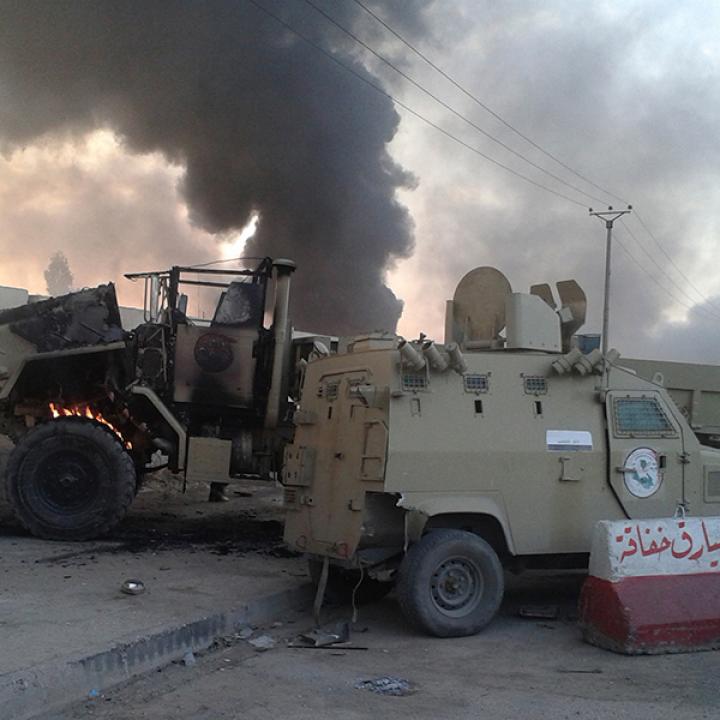
Will Sunni Regional Players Turn Mosul into Ashes for the Islamic State?

The devastation of Aleppo, Idlib, and Tikrit may motivate the Sunni leaders in Mosul and Raqqa to think and act politically rather than violently.
November 1, 2016
Intelligence evidence indicates that Islamic State (IS) militants are well-prepared for a tough street battle in Mosul. The possibility of this, in the jihadi group’s stronghold, is likely to shatter Sunni strategic bases in Iraq and Syria. However, instead of long and devastating violence, we may see a different, perhaps less violent, scenario in Mosul.
Looking at the larger geopolitical landscape, a Sunni bloc currently stretches from Mosul to Aleppo, surrounded by the Shiite coalition to the west and Kurdish forces to the east and north. There are many more key participants of this regional sketch, including Russia, the U.S., Turkey, Iran, Arab Gulf states, and smaller Shiite militias, side-by-side with Sunni-jihadi armed groups.
Since the start of the Syrian civil war in the spring of 2011, the Sunni bloc appears to be the main loser of the Arab Spring in Syria. Additionally, ISIS has controlled the Sunni triangle in Iraq since 2014, collapsing its strategic and social infrastructure. But would Sunni Arab states (Qatar, UAE, Saudi Arabia Jordan) and Turkey allow Mosul and Raqqa to collapse as Tikrit and Aleppo have, or would the key Sunni players in Iraq and Syria act pragmatically this time and work to secure their future in Mosul and Raqqa?
This article argues that Sunnis will indeed play a more pragmatic game, as a war with Iran, Russia, and the international coalition would completely destroy Mosul and Raqqa’s infrastructure, end Arab nationalism, and catalyse Shiite regional expansion by getting rid of the ‘Sunni obstacle’. Liberation operations in Mosul and Raqqa will force Raqqa residents to flee toward northern Syria and the Syrian-Turkish border, and Sunni Arab residents of Mosul into Anbar and the Kurdish region of Iraq. The balance of power in the Middle East would change drastically – and not in favour of the Sunni population.
Intelligence from Mosul reveals that IS has dispatched around 5,000 militants in Mosul, which includes more than 1,000 foreign fighters with instructions to not only use civilians as human shields, but to also destroy the city if its loss seems imminent. Additionally, while IS’ military strategy includes surface and anti-air defence mechanisms, they are also prepared to use chemical weapons. Moreover, in an attempt to halt the Mosul operation, IS may use its external operation units to launch a series of terrorist attacks in Iraqi Kurdistan, Baghdad, and even western countries.
Turkey and the Kurdish region of Iraq have different agendas. Erbil’s government seeks to gain the international coalition’s support by participating in the Mosul operation and building political trust with Masoud Barzani. Erbil is also willing to use the Kurdish-Sunni coalition to establish a region for Sunnis and provinces for Christians, Yazidis, and Turkmen in northern Iraq.
Turkey has deployed 12,000 troops and proxy militants in an attempt to preserve both the Sunni background of Mosul and the Ottoman history of northern Iraq. Other than protecting the Sunnis, Turkey is also aiming to secure its influence and control over Kurdish northern Iraq and Syria, stop Iran’s expanding influence, expel the PKK from Sinjar Mountain, and control the oil and gas fields of the region. In order to achieve these goals, Turkey launched Operation Tigris Shield on August 24 to control Jarablus and stop Kurdish forces advancing in the north of Syria.
Under these circumstances, IS will probably change its identity and relocate its headquarters. Documents obtained by Iraqi security forces indicate that most IS leaders, members, and supporters are local Islamists and former members of the Ba’ath party. Therefore, it’s likely that IS in Iraq (composed of former Ba’ath party members, Army of the Men of the Naqshbandi,and Sunni tribes opposing the government in Baghdad) would follow the same tactic, possibly reconstituting itself as a Ba’ath group, a “tribal awakening” militia, or even a liberal Sunni rebellion force. Additionally, the potential of relocation is evident in IS’s retreat from strategic areas without fighting, such as in Sinjar and Jarablus.
The devastation of Aleppo, Idlib, and Tikrit may motivate the Sunni leaders in Mosul and Raqqa to think and act politically rather than violently. The combination of these factors can shift the dynamic inside Mosul. With support from Sunni regional players, Mosul residents can turn their back on IS and lead the creation of a new Sunni, political-Islamic project.



